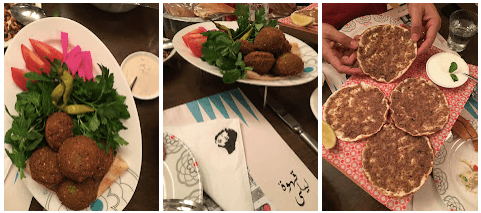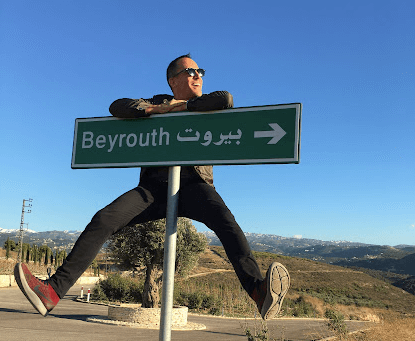TravelVince News #25
🇱🇧⚱️Cinzas libanesas | Lebanese ashes
For English, please scroll down to the British flag and Italic text. Thanks! If you haven't subscribed yet, please do so down here:
🇧🇷Quando minha avó morreu, aos 103 anos, descobrimos uma carta escrita aos 91 em que ela deixava documentado seus últimos desejos. Estava em seu cofre, junto com a cobiçada aliança de brilhantes e um rosário branco. Os desejos eram, na verdade, ordens. Duas. A primeira era para minha mãe, sua nora. Ela deveria tomar seu lugar às quartas-feiras na novena do Perpétuo Socorro acendendo velas para as almas. Justo minha mãe, que só batizou os filhos por obrigação (e praxe). Talvez fosse uma vingança além-túmulo da velha, para ver se com essa tarefa póstuma, a fé desabrocharia. Minha mãe negou prontamente dizendo que cuidava apenas dos vivos. Tinha se ocupado da sogra melhor do que da própria mãe, com quem brigava constantemente, fato do qual deve ter se lamentado nas sessões de terapia.
A segunda ordem-desejo era de que as netas que ainda fossem solteiras no dia de sua morte levassem as suas cinzas para o Líbano, de onde vieram seus pais e irmãos há milhares de anos e para onde ela nunca foi. Deve ter escutado seus nove irmãos, todos nascidos entre Beirute e Biblos, as cunhadas e os patrícios contarem sobre as mil e uma noites libanesas. Foi uma grande surpresa para todos, afinal vovó Karime era beata e jamais falou em cremação, muito menos em não ser enterrada ao lado do meu avô, seu marido de 62 anos de casamento e de uma dúzia de infidelidades. Seria outra vingança póstuma? Negar companhia eterna no caixão de cima?
A única neta que sobrou solteira foi a Soraia, que viajou uma única vez para Bariloche e nem passaporte tinha. Mas desejo de avó falecida é lei. Por isso fui escalado para acompanhá-la até o Oriente Médio (como o último neto solteiro) junto com a urna cheia de vovó torrada. Nunca tive grandes afinidades com Soraia, mas jamais negaria uma viagem.
Aterrissamos em Beirute e as nossas malas em Estocolmo. No hotel, Soraia me contou que a urna estava na mala e quase tive um surto. Por sorte no dia seguinte a Air France nos entregou as duas malas que não foram revistadas pelas alfândegas sueca e libanesa. Vovó estava novamente entre nós.
Como a carta não tinha nenhuma especificação sobre onde jogar as cinzas, decidimos fazer na vila onde nasceram nossos bisavós, pais de vovó. Biblos fica a uma hora de carro de Beirute, na beira do Mediterrâneo. Vários restaurantes e lojas chamam-se Saad, nossa família estendida. Esperamos o pôr do sol. Soraia parecia que ia a uma festa e não ao enterro da avó. Seus genes árabes à flor da pele, transmutados em maquiagem, laquê e um vestido bordado. Eu quase morri de vergonha, até porque chamava muita atenção. Vai que a gente é preso por jogar cinzas humanas na praia?
Resolvi filmar com o celular nossa mini-cerimônia para postar no grupo da família. Várias bandeiras tremeluziam em branco e vermelho com o cedro verde no meio. Soraia ficou bem na beira do píer com a urna em mãos. Parecia uma cena de Oscar. Rezou alguma coisa que não escutei pois encarnei o diretor de cinema. Quando abriu a urna, soprou um vento estranho que levou aquele pó por tudo. Uma família fazia pique-nique ali ficou com os falafels todos defumados. Os cabelos da Soraia, minha roupa, o celular, tudo foi coberto de uma fina poeira. Deletei o filme e fomos tomar uma cerveja.
Levamos o pouco que sobrou na urna de volta a Beirute. Estávamos tão cansados, bebuns e impressionados que esquecemos (ou melhor, a Soraia esqueceu) vovó no táxi. Foi impossível encontrar o carro, já que os táxis no Líbano são qualquer automóvel que resolve levar turistas para ganhar alguns trocados em dólar. Achamos que era obra do destino e ninguém precisava saber que vovó, ou o que sobrou dela, tinha desaparecido.
Um pensamento romântico me vêm à cabeça. Um fusca laranjado carregando a urna ao redor do Líbano e vovó, aos poucos, esvaindo como adubo para vinhedos e hortas. No dia seguinte enchemos uma lata de tahini com areia e fomos a Raouché, uma falésia fotogênica, para fazer o vídeo documental. Ficou lindo. Tia Miriam até chorou. Foi a festa do emoji no WhatsApp.
Lembrei de contar essa história hoje, pois a aliança de brilhantes que estava no cofre junto com a carta agora é minha. Herdei. Minhas tias brigaram tanto por ela, que acabou com meu pai, que pagou todo o tratamento de câncer da vovó, além da enfermeira que viveu com ela dos 90 aos 103 anos. Vou vendê-la e, com o dinheiro, fazer uma nova viagem ao Líbano para, quem sabe, respirar vovó na atmosfera daquela terra maravilhosa.
🇬🇧When grandma died, aged 103, we discovered a letter written at 91 in which she documented her last wishes. It was in her safe, along with the coveted diamond ring and a white rosary. Her wishes were actually commandments. Two. The first was for my mom, her daughter-in-law. She was to take her place on Wednesdays at church by lighting candles for the souls of the dead. My mother, who only baptized her children out of obligation swiftly refused, stating she only helps the living. This smelled like posthumous revenge. Grandma’s last card to bring some faith into the family so we could be saved from God’s wrath. Mom had taken care of her mother-in-law better than of her own mother, with whom she quarreled constantly, a fact she certainly discusses at length in therapy.
The second commandment was that granddaughters who were still unmarried on the day of her death would take her ashes to Lebanon, where her parents and brothers came from thousands of years ago and where she never went. She must have listened to her nine brothers, all born between Beirut and Byblos, her sisters-in-law and patricians talk about the Lebanese thousand and one nights. It was a big surprise for everyone, after all, grandma Karime was devout and never mentioned cremation, much less not being buried next to my grandfather, her husband of 62 years of marriage and a dozen infidelities. Was it another posthumous revenge? Deny eternal companionship in the coffin above?
The only granddaughter left unmarried was Soraia, who traveled only once to Bariloche and didn't even have a passport. But a deceased grandmother's wish is law. That's why I was assigned to accompany her to the Middle East (as the sole single grandson) along with the urn full of toasted granny. I never had great affinities with Soraia, but I would never refuse a trip.
We landed in Beirut and our bags in Stockholm. At the hotel, Soraia told me that the urn was in her suitcase and I almost had an outbreak. Luckily, the next day, Air France delivered the two bags that were not searched by Swedish and Lebanese customs. Grandma was among us again.
As the letter did not specify where to throw the ashes, we decided to do it in the village where our great-grandparents, grandma's parents, were born. Byblos is an hour's drive from Beirut, on the edge of the Mediterranean. Several restaurants and stores are named Saad, our extended family. We waited for sunset. Soraia looked like she was going to a party and not to her grandmother's funeral. Her Arab genes surfaced, transmuted into makeup, hairspray and an embroidered velvet dress. I almost died of embarrassment because it attracted a lot of attention. I did not want to get arrested for throwing human ashes on the beach.
I decided to record our mini-ceremony to post in the family’s WhatsApp group. Several flags fluttered in white, red and the green cedar tree in the middle. Soraia stood right on the edge of the pier with the urn in her hands. She said a prayer that I didn't hear because I was playing the film director. When she opened the urn, a strange wind blew grandma's dust all over the place. A family was picnicking nearby and got their falafel seasoned with ashes. Soraia’s hair, my clothes, the cell phone, everything was suddenly covered in a very fine dust. I trashed the movie and we went for a beer.
We took what little was left in the urn back to Beirut. We were so tired, drunk and overwhelmed that we forgot (or rather, Soraia forgot) grandma in the taxi. It was impossible to find the car since taxis in Lebanon can be any car that decides to take in tourists for a few bucks.
A romantic thought comes to mind. An orange Beetle carrying the urn around Lebanon and grandma, little by little, disappearing like fertilizer for vineyards and vegetable gardens. The next day we filled a tahini can with sand and went to Raouché, a photogenic cliff, to shoot the video. It turned out beautiful. Aunt Miriam even cried. Emojis cascaded all over the web.
I remembered this story today because the diamond ring that was in the safe with the letter is now mine. Heirloom. My aunts fought so hard for it that it ended up with my father, who paid for all of grandma's cancer treatment, in addition to the nurse who lived with her from 90 to 103 years old. I'm going to sell it and, with the money, make a new trip to Lebanon to, who knows, breathe grandma in the atmosphere of that wonderful land.












My dear, your life keeps being amazing, a wonder every time i read your news letters.
It is like a great TV series, but one that leaves you enriched.
What a fortune to have met an human being like you, I really consider myself blessed.
I am going through though times with both my parents very old and sick, dividing myself between my good life in the Netherlands and misery here, in my hometown in Italy.
I am drinking a beer after a long day, tomorrow we are moving my parents to a new home, more suitable for them.
A big hug my dear, I wish i will meet you again one day.
Ciao, Annalisa
Que história!!!
Demais Vicente!